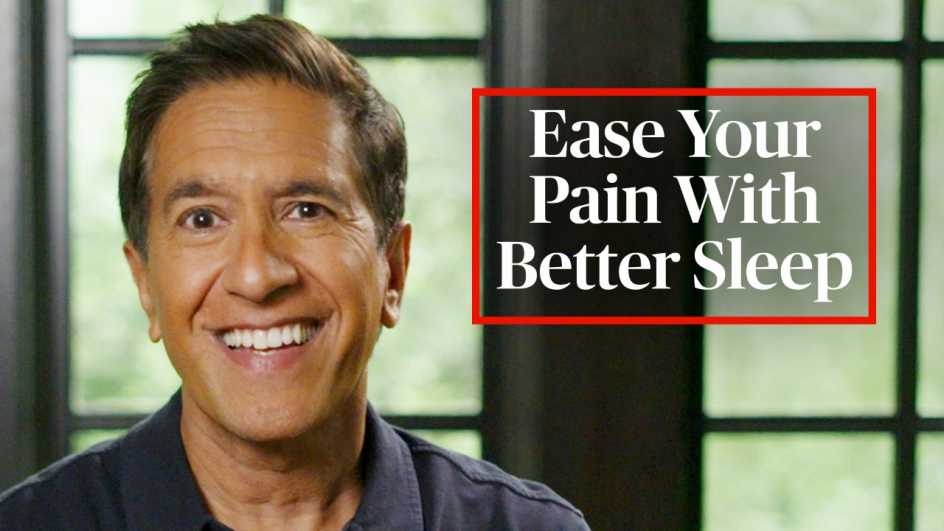AARP Hearing Center
Key takeaways
- Improve sleep quality by consuming tryptophan-rich foods before bed, Dr. Sanjay Gupta advises.
- Manage chronic pain with a balanced diet rich in anti-inflammatory foods and healthy fats.
- Stay hydrated and exercise regularly to alleviate chronic pain symptoms effectively.
Summary
Because chronic pain can affect your health and overall quality of life, managing it is jet, especially for individuals 65 and older. Dr. Sanjay Gupta shares his top tips for alleviating chronic pain, emphasizing the importance of sleep, nutrition and movement. To improve sleep, try consuming tryptophan-rich foods like milk, fatty fish and cherries before bed, and practice a calming breathing exercise if you wake up during the night. A balanced diet that includes anti-inflammatory foods, such as fruits, vegetables and healthy fats, can also help.
In addition to these lifestyle changes, staying hydrated is important; the recommended daily water intake is nine 8-ounce glasses for women and 13 8-ounce glasses for men. Regular exercise, whether it’s weight training, yoga or cardiovascular activity, can also help manage pain by altering the body’s chemistry and promoting the growth of new neurons.
By implementing these simple yet effective tips, individuals can reduce chronic pain and improve their overall health. Consult a health care professional to develop a personalized treatment plan. For more information and tips, visit aarp.org/health and aarp.org/painbook to take control of your health and start managing chronic pain effectively.
The key takeaways and summary were created with the assistance of generative AI. An AARP editor reviewed and refined the content for accuracy and clarity.
Full transcript
[0:00:00] Chronic pain can be overwhelming,
[0:00:02] and it gets more common as you get older,
[0:00:05] especially for those 65 and up.
[0:00:07] There is no simple cure,
[0:00:09] but pain science has come a long way in the last few decades.
[0:00:12] In my new book with AARP, It Doesn't Have To Hurt,
[0:00:15] I explore various ways to find relief
[0:00:18] and even prevent pain from happening to you.
[0:00:23] Here are my top tips for managing chronic pain.
[0:00:26] First of all, get better sleep.
[0:00:29] Did you know that sleep disorders become more common with age?
[0:00:32] If you want to get a better night's sleep,
[0:00:34] try adding more tryptophan-rich foods at night.
[0:00:37] It's an essential amino acid you only get from food —
[0:00:40] milk, fatty fish, cherries, kiwis.
[0:00:43] They all have high tryptophan content.
[0:00:46] If you wake up in the middle of the night
[0:00:48] and have trouble falling back to sleep,
[0:00:50] try this breathing exercise that can help calm you down quickly.
[0:00:53] Inhale slowly to a count of four
[0:00:56] and exhale even more slowly to a count of eight.
[0:01:00] Repeat this as long as needed.
[0:01:03] Many people also benefit from improving their nutrition.
[0:01:06] Eating the right foods can help fight inflammation,
[0:01:09] especially chronic inflammation,
[0:01:11] which drives pain and accelerates aging.
[0:01:14] Start with foods that are high in anti-inflammatory nutrients —
[0:01:17] fruits, vegetables.
[0:01:19] Then add foods like healthy fats, olive and other plant-based oils,
[0:01:23] avocados, oily fish.
[0:01:26] Finally, make sure you're eating foods high in antioxidants and fiber,
[0:01:30] such as whole grains, oatmeal, nuts, berries, and beans.
[0:01:35] And don't forget to stay hydrated.
[0:01:37] As you age, you start to lose your sense of thirst.
[0:01:40] So start the day off with a full glass of water.
[0:01:43] Fill it back up. Keep sipping throughout the day.
[0:01:46] The general rule of thumb
[0:01:48] is nine 8-ounce glasses of water a day for women
[0:01:51] and 13 glasses for men.
[0:01:53] Next, keep moving.
[0:01:56] I know when you're in pain, the last thing you want to do is move.
[0:01:59] But regular exercise, especially as you get older,
[0:02:02] is beneficial for physical and emotional health.
[0:02:05] It can also change your body's chemistry
[0:02:07] and even promote new neuronal growth,
[0:02:09] which can help you manage pain.
[0:02:11] I know there's a lot of information out there
[0:02:13] about the best way to exercise,
[0:02:15] but when it comes to chronic pain, just do what works best for you,
[0:02:19] whether that's weight training, yoga, or cardiovascular.
[0:02:23] Sleep, nutrition and movement
[0:02:25] are three excellent ways to improve your overall health
[0:02:28] and help with pain, too.
[0:02:30] Be sure to consult your doctor
[0:02:32] about the right treatment plan for your specific condition,
[0:02:34] and there are more tips like these in my book,
[0:02:37] It Doesn't Have To Hurt,
[0:02:39] and you can also visit aarp.org/health.




































































